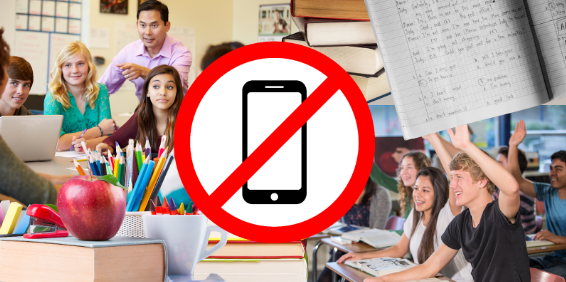Cell phones have worked their way into every waking moment of many teenagers. During school hours, many students can be found texting or scrolling on social media. Parents and teachers worry cell phones are having a detrimental impact on children’s education. In early February, a new bill was introduced to the North Carolina House of Representatives that looks to ban phones in schools.
House Bill 87 has passed its first reading in the Senate, and will soon be voted on. If passed, the bill will require every district to create a policy either banning or greatly restricting cell phone use during the school day with a few exceptions. The proposal is to be implemented at the start of the 2025-2026 school year, allowing students to use cell phones if granted permission by their teacher, if outlined by a student’s Individualized Education Plan (IEP) or section 504 plan or if required in a medical document to assist in managing a student’s health condition. In addition to these outlying conditions, this bill will not apply to remote academies, charters or private schools.
A majority of schools across the country have already put in place restrictions similar to those outlined in Bill 87. The National Center for Education Statistics, which is the independent research branch of the US Department of Education, found that 77% of public schools do not allow students to use cell phones during class. This idea is supported by many lawmakers, with Bill 87 being passed in a 114-3 vote in the North Carolina House.
Mrs. Julia Ellis, a parent of three Wake County students, shared her thoughts on the bill, asserting that phones should be regulated in schools. “I think it would be a benefit in eliminating distraction and keeping the focus on teachers,” Mrs. Ellis said, discussing how it would maximize time for learning, as teachers would not have to take time out of a lesson to remind students to stay off their phones.
Most students, however, do not share the same opinion on this topic. Sophie Shaw (‘27), a sophomore at Athens Drive High School, believes that phones should be allowed in schools, mainly for communication purposes. She shared how being able to have her phone is helpful if she forgets something at home or gets sick during the school day as it allows her to be able to reach out to her parents.
It also allows her to stay informed of changes in her sports schedule. “If I didn’t have GroupMe I would never know when practice was cancelled,” Shaw said. In situations when last-minute updates come out from administration or when extracurricular activities get cancelled, having a cell phone to be able to reach out to parents and arrange transportation could help students stay informed.
One of the main concerns parents and students have with phones being banned in schools is the loss of the ability to get a hold of family members in the event of an emergency, specifically in a lockdown situation. With 332 school shootings recorded in 2024 by the K-12 School Shooting Database, the issue of how to contact one’s parents in the event of a lockdown is on the minds of students. “I would like to be able to text my parents and let them know that I’m ok,” said Shaw. “It’s going to put a lot of ease on my parents if that happens, and it’s [lockdowns] such a big problem today that it’s just a necessity to be able to reach out to family members.” If phones are banned in schools, students may not be able to personally reach out to family members, however families may still be able to stay informed through messages sent by the school or district.
Many schools send out phone calls to parents to relay absences, school cancellations and other information. Similar messages may be able to be sent if there were to be a crisis. Mrs. Ellis imagines parents will still be able to be informed about what is going on, even if students cannot have cellphones in class. “I receive at least two messages a day from my kids’ school, so I don’t foresee a difficulty in them sending out broadcast information when necessary in the case of an emergency.” Additionally, teachers may be able to make exceptions to allow students to use their phones to contact loved ones if an emergency occurs.
The discussion surrounding what a phone ban in schools will look like remains in the air. Given the nationwide trend of similar legislation of support being given to the topic, it is possible that Bill 87 or a similar piece of legislation will be passed soon. For now, North Carolinians look to state legislators to come to a decision.










































































